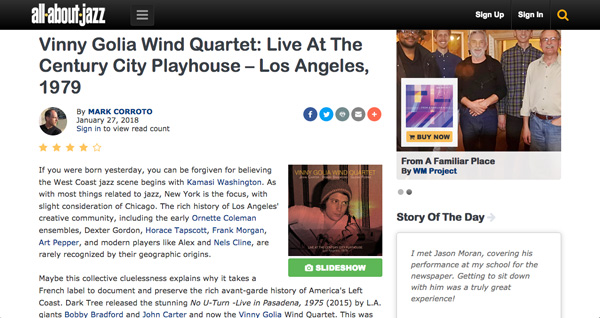• Chronique par Mark Corroto sur All About Jazz (27 janvier 2018)
If you were born yesterday, you can be forgiven for believing the West Coast jazz scene begins with Kamasi Washington. As with most things related to jazz, New York is the focus, with slight consideration of Chicago. The rich history of Los Angeles’ creative community, including the early Ornette Coleman ensembles, Dexter Gordon, Horace Tapscott, Frank Morgan, Art Pepper, and modern players like Alex and Nels Cline, are rarely recognized by their geographic origins.
Maybe this collective cluelessness explains why it takes a French label to document and preserve the rich avant-garde history of America’s Left Coast. Dark Tree released the stunning No U-Turn -Live in Pasadena, 1975 (2015) by L.A. giants Bobby Bradford and John Carter and now the Vinny Golia Wind Quartet. This was recorded in 1979 at the Century City Playhouse, which hosted Sunday night performances, and was a center of creativity. Golia had only begun his musical career (and Nine Winds record label), but he had impressed Anthony Braxton, Carter, and Bradford (who was Ornette Coleman’s sideman).
The music Golia wrote for this night was all brass and reeds. The Wind Quartet included Bradford’s cornet, Carter’s clarinet (an instrument he would soon play exclusively), the trombone of Glenn Ferris, and Golia playing multiple instruments (including baritone saxophone, piccolo, bass clarinet, alto flute, and C flute). The approach is chamber music plus improvisatory flights. With Carter and Bradford aboard, the music is unfailingly elegant. Golia has always favored multiple instruments and the contrast between instruments, switching from flute to baritone saxophone on « #2″ and alternating a swinging melody and chamber passages with « Views. » His two-part « Chronos » music reminds one of a Carl Stalling soundtrack to a Warner Brothers’ cartoon. Perhaps not borrowing the Raymond Scott covers, but using it as the musical narrative to the film’s action. Carter delivers a jaw dropping solo, freeing the clarinet from its swing heritage, forecasting the next decade of his music making. The performance ends with a requiem for the South African anti-apartheid activist Steven Biko who died in the custody of the government just two years prior. The elegy is both beautiful and haunting.
• • • • • • • • • • • • • • • • • • • • • • • • • • • • • • • • • • • • • • • • • • • • • • • • • • • • • • • • • • • • • • • •

Sorry, the comment form is closed at this time.